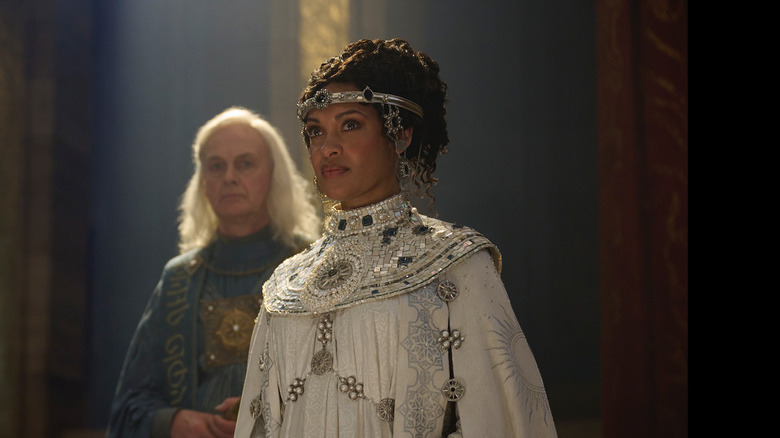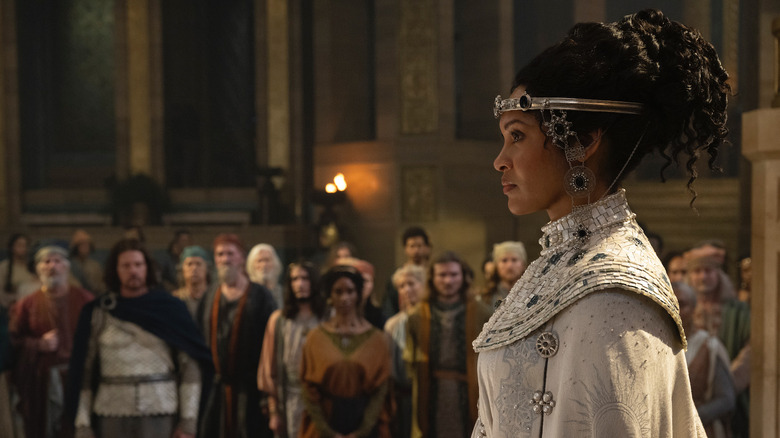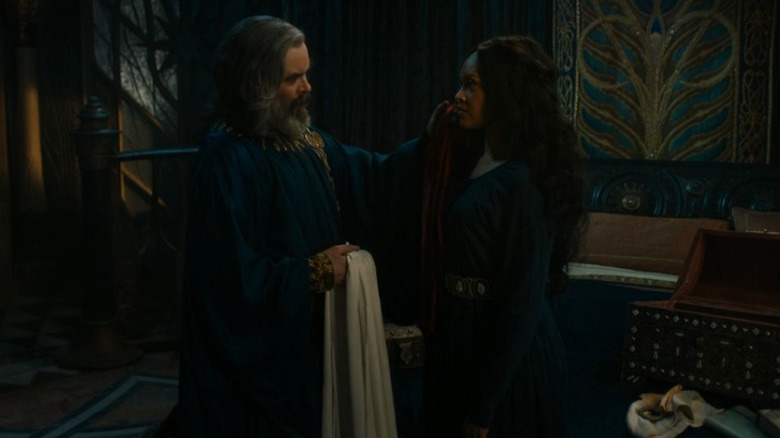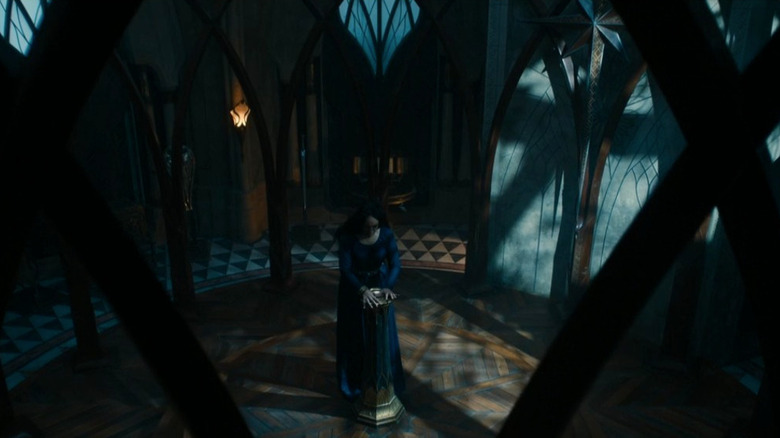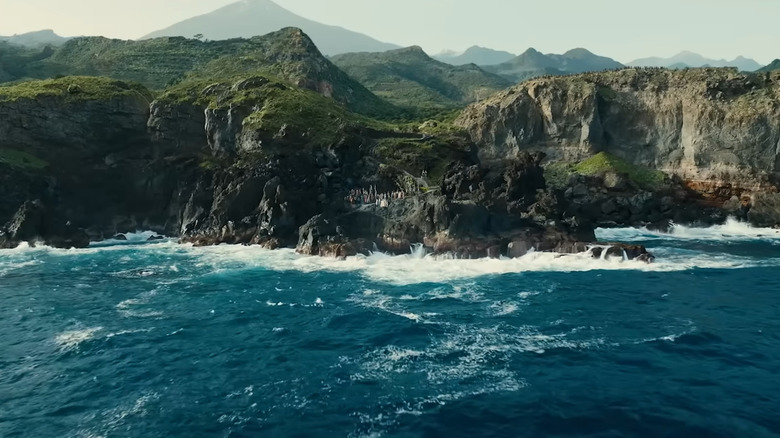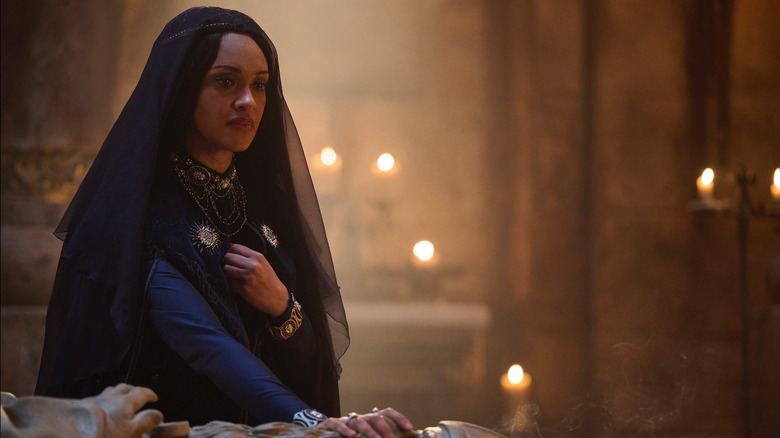The Rings Of Power's Cynthia Addai-Robinson Talks Palantíri, Sea Monsters, And Filming Underwater [Exclusive Interview]
"The Lord of the Rings: The Rings of Power" has had a busy 2nd season. Celebrimbor and Sauron are forging Rings of Power, Dark Wizards and Tom Bombadil are spicing things up in Rhûn in the East, and the Elves are preparing for war with the recast Adar. Over seas, on the island of Númenor, things aren't going well. Queen Regent Míriel (Cynthia Addai-Robinson) is locked away in a tower, and her cousin, Pharazôn (Trystan Gravelle), has seized the throne.
However, on Season 2, Episode 6, Míriel fights back. She shows up in time to save Elendil (Lloyd Owen) from being served up to a sea monster and takes the plunger herself. The blind, dethroned, and fatherless Númenórean royal faces her fears and comes out of the trial alive and empowered to take her fate back into her own hands.
Looper sat down with Addai-Robinson to talk about Episode 6. We covered everything from the Seeing Stones called the Palantiri (will we see more of them?) to what it was like to film the terrifyingly beautiful Sea Trial sequence. Here is our conversation in full. Enjoy!
An update on Míriel and seeing visions
In Season 1, Míriel came into her own. She learned the ropes and stepped into the power vacuum that her father had left. Since then, she's lost her sight, she's lost her father, she's lost her throne, a lot of which has happened off-screen. Can you give us a status update on Miriel at this point in the story? How is she doing?
Cynthia Addai-Robinson: Well, she's seen better days, let's just say that. And I think that her main concern and everything that's motivating her, or decision-making, is really predicated on that vision in the Palantir, this sort of wartime. And just the sense that her island is in danger, her people are in danger, not just from what is potentially coming, but all of the lead up that might ultimately be the catalyst, the societal division.
And so it becomes a question of what, if anything, can she do to change the course of what she sees coming? And I suppose it becomes a question of, if you see a vision and it's inevitable, but you could potentially change that vision, it certainly seems to be still worth attempting to do, even if it's futile. And at the end of the day, she doesn't necessarily know what, if anything, can alter the course. But I think she's certainly determined to try. And her being blinded, and all of these other challenges, can't really get in her way. They might sort of slow her down in some aspects, but she kind of has to charge ahead.
Now, the problem is she has very little support, and it's a very lonely place at the top. And it goes without saying that not only does her initially trusted relationship with Pharazôn obviously change dramatically, but her reliance, if you will, on Elendil, also evolves, because he's one of the very few people that she really can trust. And that trust has certainly come about through their shared experiences, their shared losses.
And really, it's going to be about how can she still fight the good fight as she gets sidelined. And what I think is really great and what we see in Episode 5 is this conversation between herself and Elendil, as she asks him about what he has seen in the Palantir when he tries to pick it up. Does he see that same sort of wave crashing down on Númenor? And when he says that he did not see that, or confirms that he didn't see it, then it becomes a question of, well, is the order of things, maybe this is what's meant to happen to avert disaster. Maybe Pharazôn's leadership, maybe him being in this position is what is meant to be, which obviously Elendil has a huge issue with. So this season is to me about that question of blind faith versus what your heart and what your morals are telling you.
Clarifying a coup and a queen in a tower
To touch on that, lonely at the top, and with her and Pharazôn, in Episode 5, we did see that he became the king coming out of that earlier coup. So can you just fill us in a little bit? That happens off-screen again. What exactly happened after we see the eagle and he draws the sword and then he's suddenly the king there?
Addai-Robinson: Well, I guess really it's essentially, he takes advantage of the moment. That was all a very sort of muddy situation where when the eagle arrives, it is not necessarily the case that the eagle is coming for him, but people, there's also Belgazar, the other character, who also senses an opportunity to turn the tide toward Pharazôn. And so they just seize the moment, really. And it's as simple as that. And really, in a lot of ways, Míriel sort of being banished to the tower is very much a parallel of what happened to her father, the king. And in the end, her father, who also was sort of a ... I guess we'll call a controversial figure ... it almost becomes like the babbling madman in the tower.
Now, he was sort of tucked away and not everybody saw the state of him, but certainly there's that concern that that could be Míriel's fate as well, that she gets banished to a tower, stark raving with a Palantir. This is obviously not going to be her fate, but in the interim, I think for Míriel, it's a chance to sort of pause before deciding what the next step is going to be. And her next steps are certainly limited.
Right. So one of those is in Episode 6. She clearly regains some agency there, because she steps up and she goes into that test, the Sea Monster test. How does the power dynamic shift in that going into and then coming out of that event?
Addai-Robinson: Well, essentially, the conversations that you see between Míriel and Elendil, for both of them, grappling again with this idea of following their faith, even if it seems to be taking them down a distasteful path that feels wrong, and following what your instincts tell you, and what you feel like is right and true and just, both have their sort of moment with that. And ultimately for her, as you say, it is a moment to have some agency and not be the queen that gets locked in the tower, never to be seen or heard from again.
So she knows that to game the system, obviously there is this sort of, in the giant book of rules that they have, that she is entitled to sort of take Elendil's place. But what is also beautiful is that, for both of them, for as much as they want to have faith in the outcomes that are meant to be, there's the fear of, what happens if you don't make it? What happens if what is meant to be is that you're meant to perish? Am I okay with that? Can I handle that? Even though I'm telling myself, "Well, this is what's meant to be, this is the natural order of things." So I think it's really beautiful that both of them grapple with that, and ultimately both of them have the sense of their own convictions to say, "I will do this and I will trust in this outcome."
The role of the Palantíri in Númenor
I just want to double back to the Palantir. You brought that up and it's interesting to have the Seeing Stones coming through the lens of Míriel, because they're closely associated with Elendil in the books. And Elendil in the show is becoming closely associated with Míriel. So, how is that trio of the Palantir, and Elendil, and Míriel, going to continue to play into the story? And just as a follow-up question. There's seven of them in the books, and we've only seen one so far. So will we see more of the Palantíri?
Addai-Robinson: I am curious about that myself. Definitely a question for the show runners, but I think what is interesting, we don't have the Rings in our realm, but the Palantir is also a symbol of something that is powerful, it could potentially be a tool for good, but it also can be manipulated and be a force for evil in the sense that, again, you can sort of manipulate and use it in the wrong way, with the wrong intention.
And it is interesting, and it's funny, because again, as I'm watching the show as well, there are scenes that I wasn't present for. And I love when you see Pharazôn finally decide, "Well, I'm going to go use this thing even though I've publicly told everybody that this is a relic, and something to sort of toss away." Of course, in secret, he can't help himself to go and take a look into the old stone. It's quite interesting what he sees — and certainly gives an inkling moving forward of what is fated, not just for Pharazôn, but for Númenor.
So I think it's a great laying of the groundwork if you know the lore. If you know how Númenor connects to the rest of Middle-earth, and certainly the unleashing of Sauron, I thought, "Oh, that vision is quite interesting." But in terms of how it also relates to Míriel and Elendil, their dynamic essentially, she is using all of her knowledge, the fact that she has been raised all her life to be the future queen and future leader, she's able to extend everything that she knows and understands to Elendil. And obviously for what his role becomes in the lore, it's a nice working backwards of, how did Elendil ultimately become the person he becomes?
That's good.
Addai-Robinson: How did he learn to be a leader? And so I believe that the intention in terms of the showrunners and how they sort of established their relationship, and even Míriel's blindness, it's essentially that they're both helping each other to see. Elendil becomes her eyes in a sense, but she also is teaching him how to observe, how to lead. She's also empowering him as well. So I think there's a beautiful dynamic that the show runners have established, so that their relationship really gets to evolve beyond just leader and loyal subject.
Right, right. That's really good.
Addai-Robinson: That goes for Elendil as well, for what he ultimately becomes in the lore.
Yeah, that's really good.
Filming underwater and the beauty of tenerife
I did want to shift a little bit into some of the practical elements. What was it like filming the underwater scene with the monster?
Addai-Robinson: It was intense, not because there was actually a monster. It really was just for myself, I have never worked in an underwater tank, and it's a very specific way that you have to film logistically. Obviously, you have a specialized tank, in this case in Pinewood in London, and there's a water safety team who are fully dedicated to water filming, both above and under the water, in this controlled environment. But in order to do that as the actor, you have to have all of the preparation, certification. They've got to make sure that you're good to go under there.
And then somebody who has literally never even used a respirator underwater, just for my own psychology, my body did not understand what it was to breathe underwater. It's a strange thing. And obviously, there are people who they are hobby scuba enthusiasts and they love it, and they're water babies, and they just don't even give it a second thought. If you've never breathed underwater, if it's something that is scary to you, then you will understand when I say that it felt so unnatural to me that there was a sense of panic every time I went under there. It really was about calming my own mind and trusting in the situation, and trusting in the environment, because I knew that I, Cynthia, was terrified. But for Míriel, it really was not necessarily, or I didn't want it to be about her terror. I wanted it to be about her bravery, and her acceptance, whatever was going to happen to her.
And so I felt like I can't show fear underwater, even though I'm freaking out, and just thinking of all the things that could go wrong. But what felt very special to me was the trust and collaboration between this water safety team that prepared me so well. And I also wanted to make sure that I could uphold the vision for the sequence that Sanaa Hamri, our director, had. We also had Vic Armstrong on that second unit as well. So there was a whole team in place. And when I ultimately got to see the sequence in Episode 6, what I thought was incredible was the marriage of everything we did in the tank, and then everything that we filmed in Tenerife, because that tidal pool, and that coastline, and everything you're seeing on screen is a real location.
And the seamlessness of the tank work with the location in that little tidal pool, I also had an amazing water double as well. So you see all of that come together, and it really is like movie magic. I mean, you are not meant to see a differentiation. You don't want to be able to go, "Oh, yeah, okay, that's clearly the tank, and then that's clearly the location." So that was very cool just because I know how the sausage got made, so to speak, to leave that result. So my hats are off to every department, visual effects, the locations team, the team that was in Tenerife where we filmed, because we had three days to do the location filming, and then I think three days separately in the tank work. So I actually filmed in the tank first. I filmed in the tank a few months before. We then went to the location and sort of filmed this sort of dramatic standoff and all of that. So yeah, it's pretty cool when you put it all together.
What's next for Míriel?
Now that Pharazôn and Míriel have gotten conflicting signs of support, what is next in Númenor that you're allowed to talk about? And will we see much more of Míriel's story this season? Because there's so many things to say in this show.
Addai-Robinson: I know. It's interesting because, again, as you say, there are a lot of things that clearly have to happen off-camera within Númenor. But Númenor is so dense and so rich, there's so much going on, so much that we could show. I would say that, after the sea trial, it goes without saying that that is pretty humiliating for Pharazôn. And it clearly is in conflict with the coronation moment and the eagle.
So I would say that I don't think he's necessarily going to just accept that outcome and go quietly into the night. He's not going to let anything get in his way. And again, I think that moment, the more telling moment in some ways is his brief moment with the Palantir, and what he sees.
So it's definitely not over. There's more to come so that we understand what the power dynamic, not only is in Númenor, where it stands, but again, once you have unleashed this chaos in Númenor, it's kind of hard to put that back in the bottle. People are still polarized. So I don't think that the sea trial is sort of the final word, unfortunately, because I don't think that's just going to be calmly accepted by the masses. So I think that oftentimes people take advantage of chaos, they sow chaos, and they use it to their advantage. And I think you're still going to see that happen, is what I would say.
